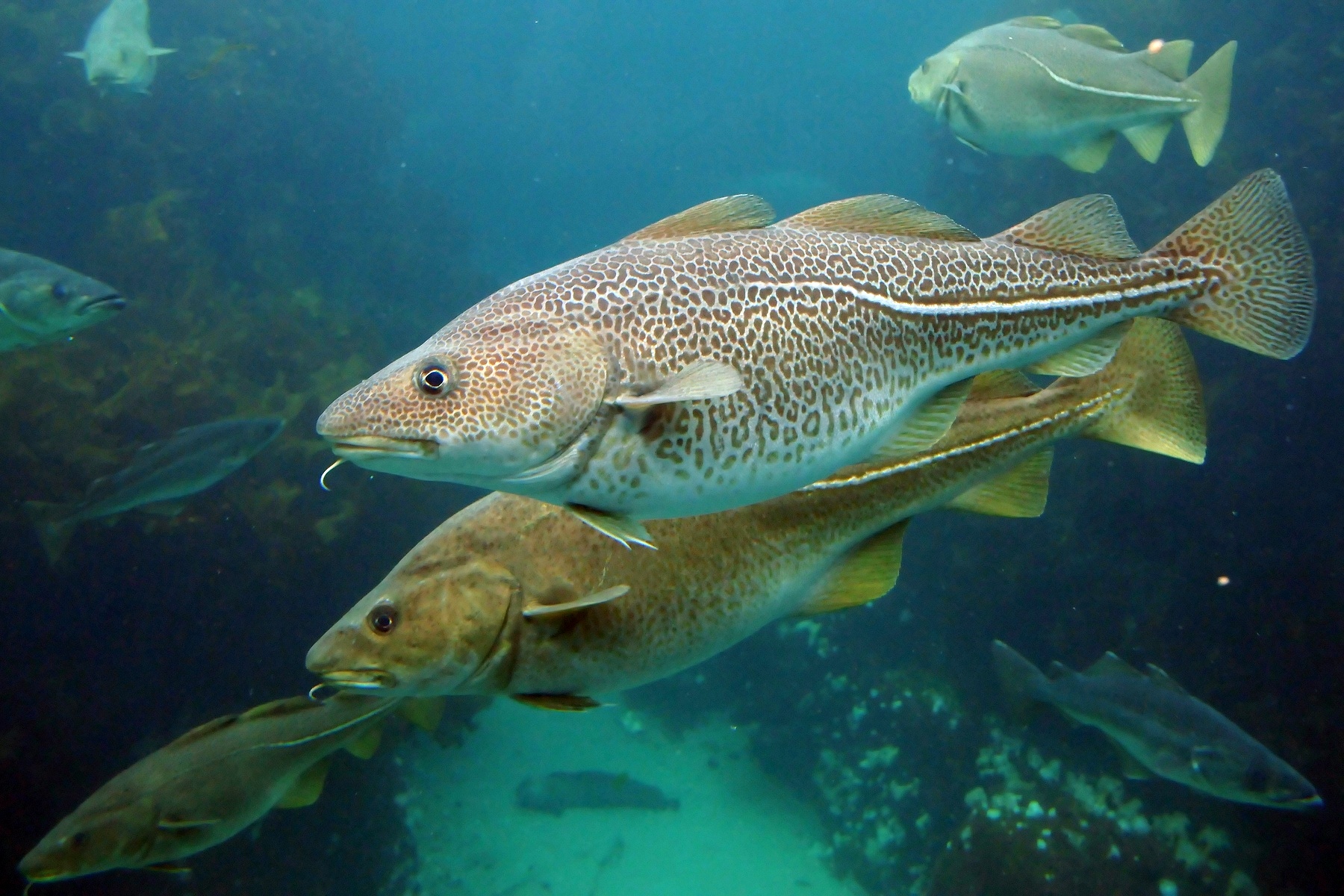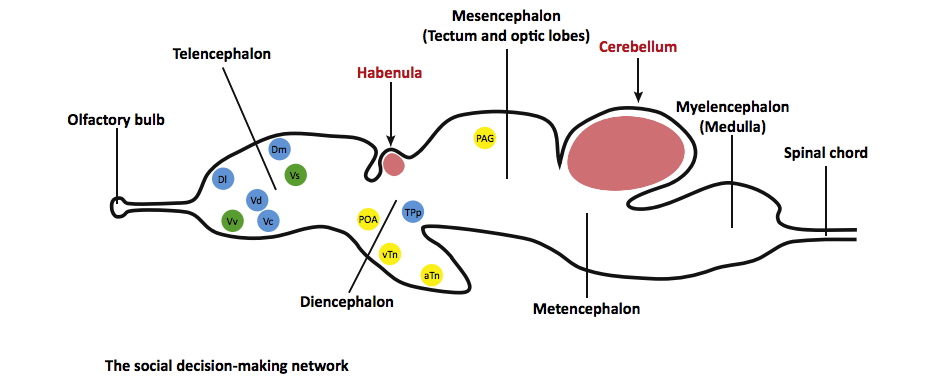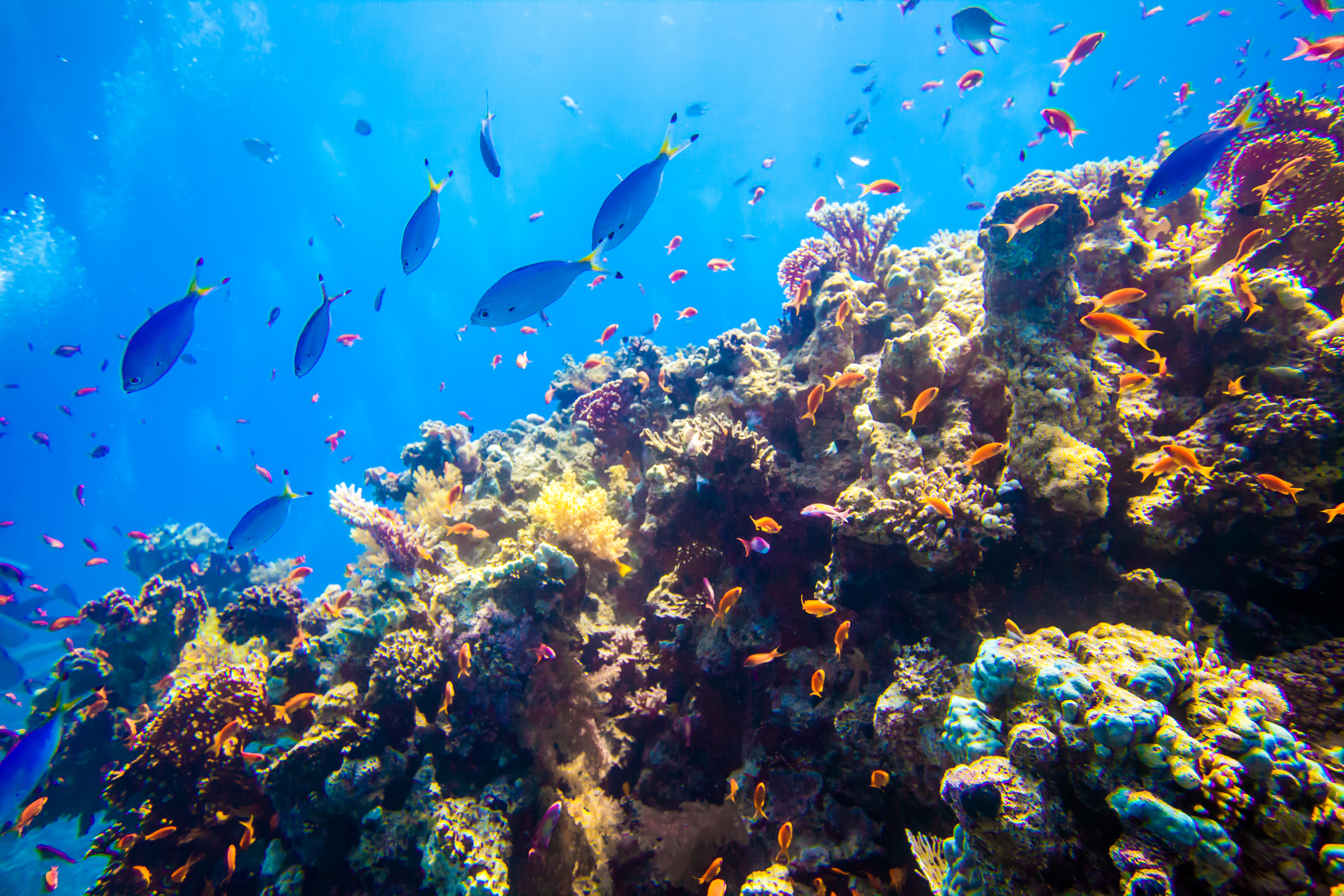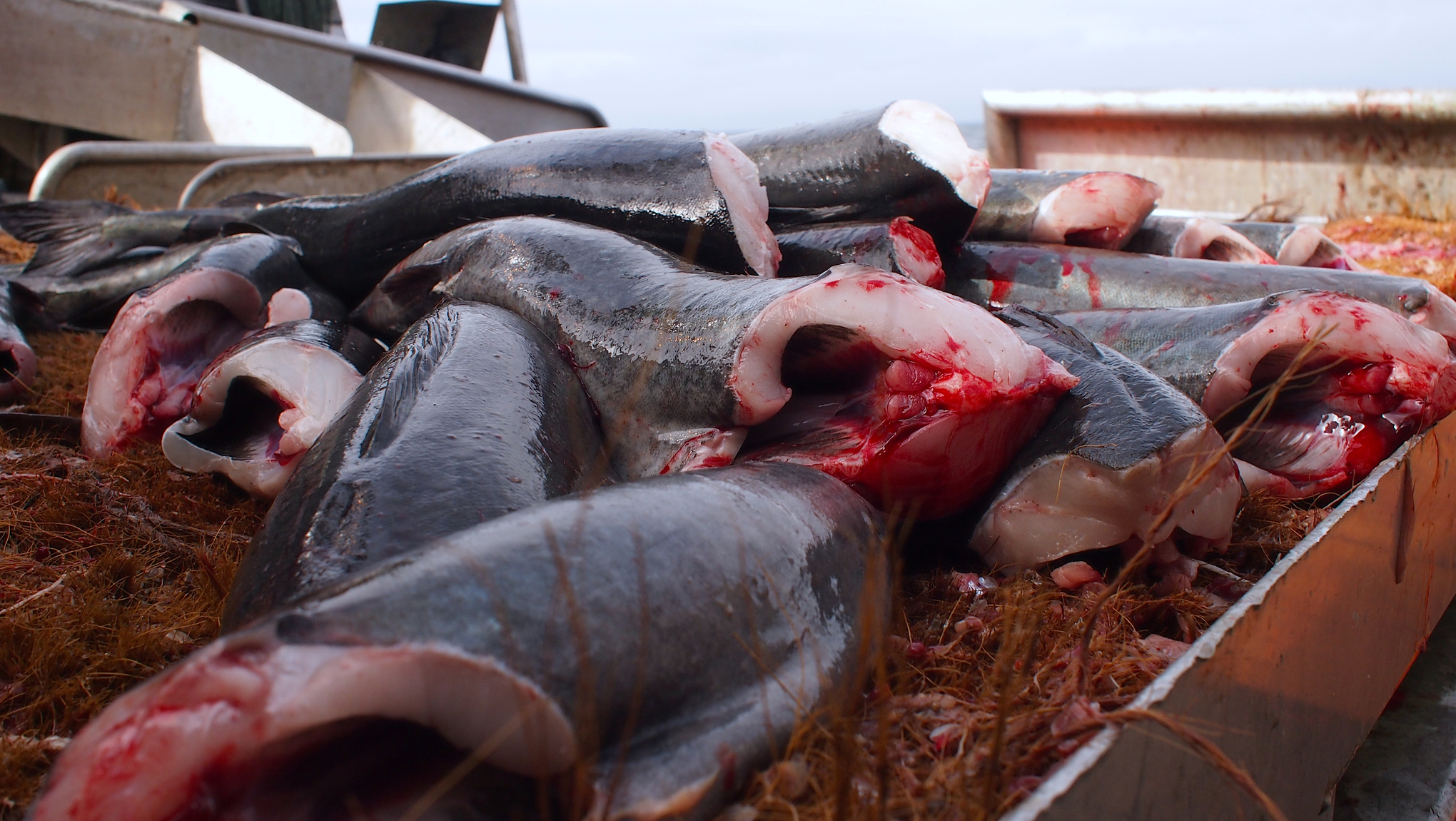/cdn.vox-cdn.com/uploads/chorus_image/image/36411950/14135239316_46d1fa98df_o.0.jpg)
Most people think of fish as somehow lesser than pigs, cows, chickens and other land animals.
We have a vague notion that fish aren't as intelligent (think of the common belief that fish only have a three-second memory) and genuinely wonder whether they can feel pain. Lots of people consider themselves vegetarians, but eat fish while abstaining from all other meats.
Australian biologist Culum Brown has a provocative argument in response, based on his years of research into fish behavior and learning. "They're just not any less intelligent or sophisticated than terrestrial animals," he says. "That idea is a total myth."
Fish don't have a three-second memory, Brown has found — in fact, they can be taught how to evade a trap and remember it a year later. Fish can learn from each other, recognize other fish they've spent time with previously, know their place within fish social hierarchies, and remember complex spatial maps of their surroundings. There's even some evidence, Brown has written, that they use tools.
So why do we think of fish as stupid? "People just don't interact with fishes in any meaningful way," Brown says. "The aquatic world is completely different from the terrestrial one, and fundamentally, if you haven't seen an animal work in its environment and understand how it works, you're really never going to fully understand it."
All this, if true, could have huge ethical implications for the commercial fishing industry — and, even more so, the people who consider themselves vegetarian but eat fish. Recently, Brown laid out this case in the article Fish intelligence, sentience and ethics. I spoke with him to hear more about his views.
Joseph Stromberg: First off, can you talk a bit about some of the fish capabilities that you've observed in experiments that might surprise people?
Culum Brown: The first one is memory. Everyone thinks that fish have a three-second memory. I have no idea where that started.
One of the first experiments I ever did with fish involved memory. I just caught some fish out of creeks around the university, put them in this fish tank, and ran an artificial trawl — which is basically a net with a hole in it — up and down the tank. To avoid getting trapped, the fish just had to figure out where the escape route was.
Within five trials, of roughly 15 minutes each, they had learned the escape route — they knew exactly where it was. I thought that was evidence of rapid learning, but not all that surprising. But what did surprise me is that I tested them a year later, and they continued to improve their escape route responses. It was almost like I just did ten trials in a row. And in the wild, these fishes typically only live one year, though you can keep them up to five years in captivity. So effectively they had an hour's training, and they remembered it for their entire lifetime.

After that, I did some work on social learning. I'd seen that if I tested fish on their own, it seemed to take longer for them to learn than if I tested them in groups. So then I did the same trawling test, and found that a group of five fish learned much more quickly, but a pair of fish took three times as long. It was pretty obvious that they were paying attention to each other.
And it turned out that they can learn all sorts of things from each other. At Cambridge, I did some experiments hatchery-raised Atlantic salmon — we taught them how to recognize live prey, simply by putting them in a tank next to a demonstrator fish that had already been trained to recognize bloodworms. Normally, when you first expose a hatchery fish to live prey, they're actually scared of it — they've never seen it before. After 20 trials, you can teach them individually to eat it. But if you let them see another individual fish eating it, it only takes about five trials for them to learn.
So there's this massive social feedback. And we also used it to teach them things like the location that prey are likely to show up. If you show them a neighbor feeding at the surface, the observer fish will preferentially go to the surface for food — and if you show them one feeding at the bottom, they'll go to the bottom. You can even batch-teach the fish: you can have multiple observers watching the same demonstrator, and they'll all learn. You can even use a video screen — they'll learn from watching a recording of a fish too.
So eventually, we started to wonder: if fish can learn from their peers, can information be passed one from generation to another? And we've basically showed that it can. We used guppies — we taught them to travel through a random door to access a pile of food, and we started with a group of six or so, then gradually replaced them with naive fish until none of them had been taught by us, but the group as a whole retained the knowledge to travel through that original door, even though it's completely arbitrary.
And there are examples of this sort of social, cultural tradition in wild fish. They largely have to do with movement and migration. For example, there's a fish called a French grunt which during the day, typically hides amongst the spikes of sea urchins. Once the sun goes down, they migrate out to foraging patches. And it turns out that the routes they take are completely culturally controlled.
Some researchers did fantastic experiments where they transplanted populations of French grunts, and in some circumstances they had access to the residents of the new place, but in other cases the residents had been removed. And when the residents were still there, the transplanted individuals followed them on their route, but when they were removed, the transplants went off in the same direction that they would have had they been at home — and so they couldn't find foraging places that were as good.
We even think that this sort of cultural transmission, in some cases, could have an impact on humans. Because species like Atlantic cod, and various other important fish species, seem to do exactly the same thing. So part of the reason that cod fisheries are collapsing is that we keep fishing out the largest fish, which are the most knowledgable ones — we take away the animals that know where the resources are, and it's shifting their migration patterns.

Brown believes that disproportionate fishing of older, more knowledgable Atlantic cod has disrupted the species' migration patterns. (Joachim S. Müller)
JS: You've also done a lot of work on the relationships between individual fish. Can you tell me about that?
CB: Sure. As part of my PhD, I wanted to look at whether it mattered who you put fish with — can it be random, other fishes, or does it matter if they actually know each other. And it turns out that fish actually care: if you give them a choice between going in to a tank with a whole bunch of random fish, or another with individuals that they've seen previously, they nearly always go with the previous ones.
It takes about 10 or 12 days for them to become really familiar with new fish. And though no one's really pressed it, at least with guppies, they can learn up to about 15 individual identities.
It seems that learning identities is really important for them, so they can figure out each fish's position in the hierarchy. We've seen that they can do that. And they not only interact with others and figure out their place in the hierarchy, but can do it from a third-party perspective. If a fish sees two other fishes fighting, it can take note of the outcome of that interaction, and it's much more likely to engage and attack the loser — the fish that they think is lower in the hierarchy — and much less likely to attack the winner.
And in terms of third-party observation, we've even seen that if two males, for instance, are fighting one another, they actually change their behavior depending on who's watching. If the third party watching is a male, they typically increase their aggressiveness, but if it's a female, they decrease their aggressiveness, because for mating, females aren't keen on on aggressive males.
In a sense, none of this is all that surprising. Fish live in these complex social groups. And they're just as good as other vertebrates in terms of social intelligence.
JS: Is there any sort of neurological evidence for these sorts of social capabilities?
CB: Well, there've been papers that show that depending on a species' level of social interaction, the brain can form in certain ways. The part that's responsible for keeping track of relationships tends to be enlarged in very social species.
Initially this idea was created just to describe humans. But then it had to be adapted to describe primates, and birds, and so on, as we found it was true for them as well. And now, mostly recently, researchers have shown it to be true for fishes. Basically, it just seems to be a truth of biology: if you need to keep track of social relationships, you need to have the underlying brain structures to process that information.

A diagram of a fish's brain structures that appear to be involved in social thinking. (Bshary et. al., Trends in Cognitive Science)
JS: What about the fish capabilities — in terms of spatial recognition — that you wrote about?
CB: Right, a lot of the work I've done has involved spatial learning in fish. And this is another area where fishes are just as good as land animals.
The first thing is that fish are obviously capable of remembering locations. Anybody who feeds fish will tell you this. In the morning, at the appropriate time, the fish will gather at the right end of the tank, expecting to be fed. That's called time-place learning — they're learning a place and associated it with a time. And we did some experiments that showed you can teach fish to gather at one end of the tank in the morning, and the other end in the evening.

Two orange-dashed gobies. (Klaus Stiefel)
Some more recent stuff we've done has involved spatial learning in intertidal gobies — they're the most common species you find on the beach in these rock pools. It turns out that rock pool fish are especially good at spatial learning. These gobies, for instance, can learn a T-maze very quickly. And if you mark them in the wild, with a florescent tag, you find they tend to stay in the same rock pool for weeks, but if you do displace them — say, pick them up at low tide and move them 30 meters — within a few days, they're back in their home pools.
There was one elegant experiment done back in the 1950s, in which a researcher set up as artificial tidal environment: two shallow pools and one really deep one, which represented the ocean. And he actually raised and lowered the tide, so sometimes the shallow pools were filled and connected, and other times they weren't. Eventually, he could poke the fish with a stick, and they'd leap into the air and land in a neighboring pool — they spatially remembered where they were, even when they weren't connected. This is what we call a spatial map. When they're leaping, they can't see where they're going. They have to do it through memory.
JS: Okay, so given these capabilities, why do you think people assume that fish are less intelligent than land animals?
The Great Chain of Being, a concept first created in Ancient Greece and further developed in the Middle Ages, put humans above animals in the hierarchy of creatures — and land animals above sea animals. Click to enlarge. (Diego Valades/Wikimedia Commons)
CB: I think there are two reasons. One is quasi-scientific, and it's got to do with the historical Christian influence over the way scientific thinking developed in the west. If you didn't say that humans were at the top of the ladder, in terms of species, you got burned at the stake. So as people began to think about evolution, they thought of it as a gradual progression, with humans at the top. Then came land animals, then came fishes. The bible even says very specifically that fish are here to be exploited by us. It does say that all animals are placed here for us, but fishes are always viewed as the lowest rung. So as scientists began to understand evolution, they still thought of it as a hierarchy of animals.
But that's a twisted view of evolution. It's just not how it works. If you look, for example, at perch — they only emerged at the same time as humans did. They're no more ancient than we are. Both humans and the perch are basically the current branches at the end of the evolutionary tree. Evolution has had more than enough time to work on fish behavior and making it just as sophisticated as any other animal's.
And evolution, fundamentally, is random. There are random mutations, and some of them work, and some of them don't. It's not progressing towards some higher goal. But at schools today, you still get this teaching of progressive evolution — moving up through tiers, from fishes, to amphibians, to reptiles, to birds, to mammals, to humans. That's part of the problem.
The other big reason is that people just don't interact with fishes in any meaningful way. In the US, something like .005 percent of people go scuba diving — like 5 in every 100,000. The aquatic world is completely different from the terrestrial one, and fundamentally, if you haven't seen an animal work in its environment and understand how it works, you're really never going to fully understand it. So, chances are, you either ignore them entirely or you misunderstand them.
That's why if you ask the average person "do fish have a three-second memory?" they'll say yes. And when I tell people what I do, that I study fish behavior, you should see the looks on their faces. Most people look at me in disbelief, and the standard answer is "but fish don't do anything."
I have something of a traveling roadshow which I take to schools, and science fairs, and overwhelmingly, people are in disbelief about what fish can do. They just don't think about it. And the new generation of kids are so far removed from the natural world — they don't know where food comes from, and they've never been anywhere where there isn't air conditioning. So trying to teach them about the environment, and animal behavior, is really tricky. It's rewarding, because you get a fantastic response, but it's difficult. I tell them — stick a snorkel on your head and go out and see the world.

A coral reef in the Red Sea. (Andrew K.)
JS: All this prompts one big question — if fish really are as smart as land animals, what are the ethical implications of that?
CB: It's a really interesting circumstance. If you do scientific research on fish, you have to go through the same procedures as if you were working on dogs, or cats, or monkeys. You have to go to the ethics committee, and explain the harms, and the benefits, and all that. So for most scientists, there's no implication.
But for the rest of the world, there are huge implications. For example, Britain is thought of the most progressive country in the world, in terms of animal rights. It just started to bring in legislation for aquaculture, which basically says that producers must report the number of animal deaths — which is absolutely fundamental — and they must report when they ship fish around. But this began back in the '50s and '60s for terrestrial commercial farms, when we started to think about things like moving pigs on the backs of trucks, and whether chickens had access to the real world. That revolution stopped at the water. Every major commercial agricultural system has some ethical laws, except for fish. Nobody's ever asked the questions: "What does a fish want? What does a fish need?"
Part of the problem comes back to the question of whether fish feel pain. But for the last 30 years, the neurophysiologists have known that they do, and haven't even argued about it. And from an evolutionary perspective, our pain perception systems —and the systems of all terrestrial vertebrates — come from a fish-like ancestor. Whether they're in the water, or on the land, they all have the same pain receptors. But for some reason, a lot of people refuse to believe that fish can feel pain. There was a paper that came out just last year that basically said, "Fish don't feel pain because they don't have the same brain as humans." It's the most ridiculous argument, but the paper got a huge amount of press. Maybe it's the kind of message people want to hear.
I think, ultimately, the revolution will come. But it'll be slow, because the implications are huge. For example, I can't think of a way to possibly catch fish from the open ocean in a massive commercial way to meet demand that would be anyway near our standards for ethics if we think of them like other animals. Currently, you go out, you catch a bunch of fish, you crush most of them to death in a net, you trawl them up from the bottom of the sea — which causes barotrauma for most of them — you dump them on a deck, half suffocate to death, the ones you don't want get thrown overboard and die anyway, and the ones you keep go on ice, just to preserve the flesh for market reasons. How do you do that in a way that has the fish's interests involved to any degree? You can't.

Black cod caught off the coast of Alaska. (Nick Rahaim)
So it's not surprising that there is some fierce opposition to this idea. It would mean a massive change in the way we do things.
For aquaculture, at least, we have some control, and I suspect the movement will begin there. I could envision having Atlantic salmon, say, from a farm, that has some sort of humane treatment approval — free-range, or whatever — for people who are willing to pay a little more for some animal that's been treated reasonably well.
JS: That's interesting. Right now, that's something that exists for other kinds of meat, but doesn't at all for fish, to my knowledge.
CB: Right, it does. If I go into a shop in the UK, or US, or Australia, I can probably find beef or lamb where the welfare of that animal has had at least some effect on the practices. But that product does not exist for fish. There's no such thing.
And another interesting difference — frankly, it's bizarre — is how there are lots of people who call themselves vegetarians, but they eat fish. As though fish aren't animals. Are they potatoes? I don't really understand that perspective.
Note: this interview has been condensed and edited.
